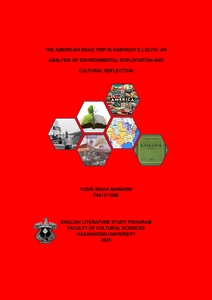MAWARNI, YUSRI INDAH (2025) ROAD TRIP AMERIKA DALAM NOVEL LOLITA KARYA VLADIMIR NABOKOV: SEBUAH ANALISIS TENTANG EKSPLOITASI ALAM DAN REFLEKSI BUDAYA = THE AMERICAN ROAD TRIP IN NABOKOV’S LOLITA: AN ANALYSIS OF ENVIRONMENTAL EXPLOITATION AND CULTURAL REFLECTION. Skripsi thesis, Universitas Hasanuddin.
![[thumbnail of Cover]](/45736/1.hassmallThumbnailVersion/F041211066_cover.jpg)

F041211066_cover.jpg
Download (335kB) | Preview
F041211066_Bab 1-2.pdf
Download (280kB)
F041211066_dapus.pdf
Download (276kB)
F041211066_full Text.pdf
Restricted to Repository staff only until 26 March 2027.
Download (1MB)
Abstract (Abstrak)
In the mid-20th century, road trip culture in the United States developed into a symbol of personal freedom. However, this cultural phenomenon also contributed to environmental exploitation, a theme subtly depicted in Lolita, a novel by Vladimir Nabokov. The research aims to analyse environmental exploitation through cultural reflection in road trips and consumption culture as portrayed in Lolita through an ecocritical lens, focusing on the novel’s intrinsic elements. The method employed is qualitative descriptive, with Novel Lolita as the primary data source. This study examines the environmental exploitation embedded in travel culture as represented in the novel using an ecocritical approach. The study finds that in the novel, the American landscape serves as a backdrop reflecting ecological exploitation caused by human activities, explored through the journey of the main characters. Nabokov illustrates the drastic transformation of natural environments, from once-majestic mountains to polluted tropical beaches, symbolizing a societal shift that prioritizes comfort and personal freedom over environmental responsibility. Furthermore, the study reveals how Humbert and Lolita’s long journey represents the tension between individual freedom and the duty to preserve nature. This study concludes that Nabokov highlights how travel, often perceived as a form of freedom, can paradoxically contribute to environmental degradation. Research on environmental issues in Lolita remains scarce, as most previous studies have focused more on the psychological aspects of the characters and the central theme of Lolita’s exploitation. Therefore, further research is recommended to explore environmental degradation in the novel through a more in-depth ecocritical perspective.
| Item Type: | Thesis (Skripsi) |
|---|---|
| Uncontrolled Keywords: | nature issue; American culture; ecocriticism; individual freedom. |
| Subjects: | P Language and Literature > PR English literature |
| Divisions (Program Studi): | Fakultas Ilmu Budaya > Sastra Inggris |
| Depositing User: | stfathirah s |
| Date Deposited: | 21 Apr 2025 03:16 |
| Last Modified: | 21 Apr 2025 03:16 |
| URI: | http://repository.unhas.ac.id:443/id/eprint/45736 |


